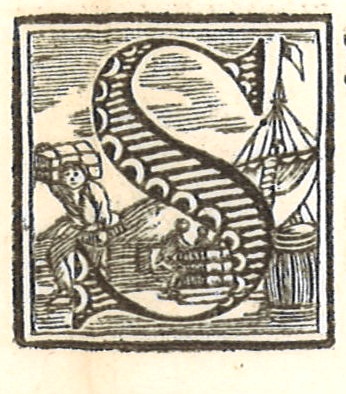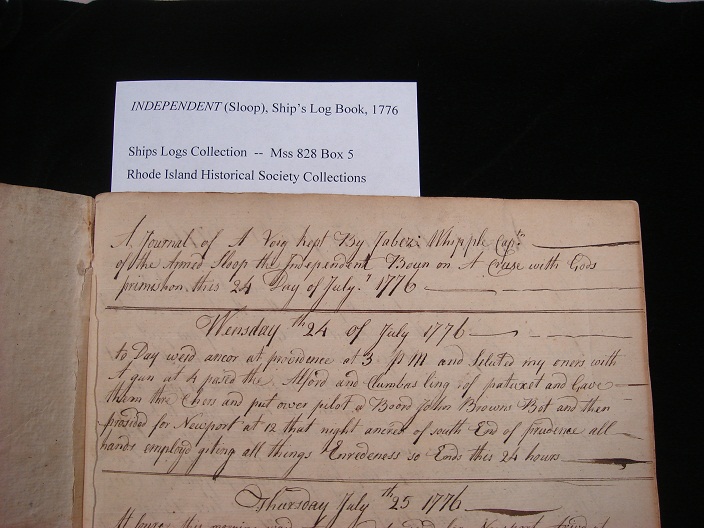

An important part of Dixon’s research involves taking a close look at the sea routes using the information in logbooks—logbooks in our library manuscript collections at RIHS, and logbooks at two other libraries in New England. I asked him to describe his experience as a researcher in the RIHS library.
KPC: The log books are roughly sewn together, often worn, stained, and the handwriting varies greatly. What is difficult about studying original manuscript log books?
JD: I think the most difficult thing about using them is keeping my eyes and fingers going through a full day at the archives. Transcribing the handwriting is a challenge on its own, but transcribing so much of it is a real test of endurance. It is especially difficult because tabulated numbers, unlike words in sentences, often do not have convenient context clues to help decipher them; in addition, a slight misreading of a 1 instead of a 7, for instance, could have a dramatic impact on the mapped location of the ship.
KPC: Our Ships Logs Collection, MSS 828, included two logs which appear to have been kept on the same voyage. The logs are both dated Jul-Sep 1776 for a sloop-of-war (although the name of the sloop is given as Independent in one log and Independence, in another, they appear to be the same voyage.) Why was this a useful find for you?
JD: The existence of two logs gave me an opportunity to compare a deck log to a log that did include the day’s work. For instance, on 8/8/1776, both logbooks recount the punishment of Benjamin Syms for causing some sort of problem on board. In the Independence, the event is called a “Desturbince,” and the keeper simply noted that Syms received a strapping from the master. In the Independent, the master’s logbook, he notes (and this is a direct transcription with spelling unchanged):
“Beniman Syms raysing a muteny on Boord the Slupe Independence I peleg hoxy master Gave a [St]rapping I found it to Be the Method to take.”.
Clearly, his log had a different perspective and audience than did the deck log; reading both together helps reveal how the master’s responsibility was tied to his perception and record of an event that was recorded with less gravity by the officer on duty.
KPC: You have said you found the occasional British watermarks on paper in the logs used by colonists to be interesting.
JD: I am not sure what to make of them right now … a Britannia watermark in the logbook of a patriot merchant or privateer makes for great irony that might be useful in my writing.
KPC: Did you change anything about your research plan after you became more familiar with the sources ?
I did make some changes to my research plan, largely in terms of what I was recording and what I was not. For instance, I began to realize that recording soundings was important. Also, I had originally hoped to use primarily American logbooks, but finding more interactions among vessels from different countries, I began to realize that I may need to expand my scope. Of course, my research plan was initially very fluid, so I had always intended to adjust as I began to develop of better sampling of the material available.
KPC: Can you tell me a bit about what it was like to do research in this RIHS Library ?
I think that the greatest difference [between RIHS and other research libraries with similar maritime records] was the clientele. More than the other repositories, the RIHS researchers included many non-academic researchers interested in local history or genealogy. Of course, the other repositories did serve non-academic visitors in good numbers , but the atmosphere of the RIHS library still felt more public, with a broader cross-section using the same sources. As far as carrying out my own research, it was very similar. The rules for protecting the material were similar, and the librarians and archivists were very helpful at all three locations, both in pulling material and in suggesting good resources and ideas to develop my project.
KPC: Did you find material for another project? Will you be returning to use other collections in this library?
JD: Another project – oh my! I have not thought ahead that far, I must admit. I certainly found some interesting material that is related but not central to my mapping work (the watermarks being a good example), but it might take me a few years before I have any sense of what to do with them. It may be that I will find similar areas for further investigation after I begin analyzing my data at the end of the summer.
For more information on the collection of ships logs please contact the Library Reference desk at Reference@rihs.org. For information on maritime records see American Maritime Documents, 1776 – 1860, by Douglas Stein (Mystic Seaport Museum, 1992). Many Thanks To John Dixon for sharing his insights into the ships logs and his generous sharing of information on maritime research.
Katherine Chansky, Special Collections Reference Librarian
JD: Another project – oh my! I have not thought ahead that far, I must admit. I certainly found some interesting material that is related but not central to my mapping work (the watermarks being a good example), but it might take me a few years before I have any sense of what to do with them. It may be that I will find similar areas for further investigation after I begin analyzing my data at the end of the summer.
For more information on the collection of ships logs please contact the Library Reference desk at Reference@rihs.org. For information on maritime records see American Maritime Documents, 1776 – 1860, by Douglas Stein (Mystic Seaport Museum, 1992). Many Thanks To John Dixon for sharing his insights into the ships logs and his generous sharing of information on maritime research.
Katherine Chansky, Special Collections Reference Librarian

It’s nice to know that there are still organizations or groups that try to preserve marine or seafaring archives. I think that this is important for future generations and at the same time, we can learn a thing or two from these items–it’s just taking a history class all over again.